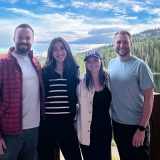Cinephile’s Dream Calendar: Max’s Picks for the 2nd Half of May
May 15, 2012
Well now that we’ve all gotten our Avengers fix in, it’s time to take a look at the repertory high points in the second half of May, and boy, are there some fantastic movies. Below are the three screenings I’m most excited about.
Don’t miss the complete May calendar! You can sign up to receive the calendar by email, or Tweet with the author.
Dog Day Afternoon/Network –If you need a break from finals week and your idea of relaxing is watching Lumet’s two greatest films on the big screen, then this is the spot for you. Lumet began his career directing on stage, then moved to television, and then into features. He received an Oscar for his first film 12 Angry Men. From there, he continued to make a string of great films including The Fugitive Kind and The Pawnbroker. By the mid-1970s, he was making masterpiece after masterpiece. In 1974, he released Murder on the Orient Express, the next year he released Dog Day Afternoon, and the year after that, he released Network. Those last two films may be the best he ever made, and they make for one amazing double feature.
Dog Day Afternoon, written by Frank Pierson (who won an Oscar for his screenplay), was based on an actual bank robbery in New York City in August of 1972. The men had planned for a quick robbery, get in, get the money, and get out. Things quickly spiraled out of control, and it became a hostage situation. It became a media sensation immediately, as bits and pieces of the personal life of one of the robbers came to light. The hostages began to bond with their kidnappers and consider them friends. After twelve hours, it was all over. The film works so effectively in every way. Almost the entire film takes place within the bank, yet with Lumet’s stunning direction, you never feel bored or see him repeat a camera movement. Pacino and Cazale are both at the top of their games here. Pacino chews the scenery (this is, in my opinion, his finest performance ever) while Cazale is the quiet, subtle type and says so much with only a small change of expression. It is a master class of contained filmmaking, not to mention a great portrayal of what a media circus seemingly any event can become.
Lumet’s follow up, Network, goes on to explore that idea of the media circus at much greater length. Written by the legendary Paddy Chayefsky (Marty, The Hospital), the story follows the fictional news network UBS. The network is struggling in the ratings until Howard Beale, their nightly news anchor, goes crazy on the air. The network continues to let him host the news and instead of reporting, he goes on crazy rants each and every night. The ratings increase dramatically, but the executives must decide what is more important: Howard’s mental health or their ratings and wealth. The film is a cutting satire of the television industry and predicted reality television almost 25 years before it began to fill our televisions. The film won three of the four acting Oscars in 1976 and won another Oscar for Chayefsky, but did not win for director or picture. Lumet was also nominated for Dog Day, but did not win for that either. Along with Kubrick and Hitchcock, Lumet is among that group of legendary directors to never win an Oscar for directing. These are absolute must see films for any student of film history.
Saving Private Ryan – There seems to be two different Steven Spielbergs. One makes well crafted popcorn flicks and the other is a serious artist (the two do, on occasion, meet). For every Jaws and Indiana Jones film Spielberg makes, he also ends up making a Color Purple or a Munich. This film is one of his most successful at blending the two Spielbergs. In the mid-1990s, he decided to make a film for his dad, a World War II veteran. He had already made Empire of the Sun, which takes place during WWII, and had made several other films that took place in that time period, but it wasn’t actually about the war his father had served in. He eventually found his WWII movie when Tom Hanks brought him a script written by Robert Rodat about the U.S. Government sending a group of soldiers out to recover one man whose three brothers had all been killed in battle. It looks like a Spielberg film, but is heavily indebted to the great propaganda films made during World War II by filmmakers like John Huston and Frank Capra. Obviously you cannot talk about the film without referencing the Normandy sequence, which opens it. The sequence is 27 minutes long and is possibly the most realistic display of WWII combat ever put on film. It is a sequence that demands to be seen on the biggest possible screen with the best possible sound system (the sound work and the editing here are absolutely fantastic). Luckily the Aero will provide both. Most of us are probably too young to have seen the film in its original theatrical run, so here’s your chance to see it on the big screen.
Jurassic Park Triple Feature – More Spielberg here. This is becoming an annual tradition for the Aero, just like the annual tradition its sister theatre the Egyptian has of screening a Back to the Future triple feature. Spielberg bought the rights to Crichton’s novel before it had even been published, winning a massive bidding war thanks to backing from Universal Studios. Crichton’s novel was cutting edge at the time, with its ideas of cloning and bringing back extinct creatures, all surrounded by a fantastic story with great characters. In short, everyone knew it would make for a great film. It was the perfect film for Spielberg at the time, who was not at the top of the world thanks to the failure of his previous film Hook both critically and commercially. He put together an amazing cast and created a true thrill ride of a film. In addition to James Cameron’s Terminator 2: Judgment Day, this was the film that introduced the world to CGI (although credit should be given to Stan Winston and his crew for their amazing animatronic dinosaurs as well). The first film is a lot of fun, but its follow up, The Lost World: Jurassic Park did not seem to be fun for all parties involved (Spielberg actually let screenwriter David Koepp direct several sequences) and the final product shows it. It has moments of greatness, but for the most part, the film does not work. The third film, released four years after The Lost World, brought back Alan Grant and Ellie Sattler from the original film, but with Joe Johnston directing instead of Spielberg. Again, the results are mixed, but certainly enjoyable. Having the opportunity to see all three films back to back on the big screen is not to be missed and will certainly be a good time for all those in attendance. Personally, I’m still waiting on Jurassic Park IV because the script they wrote for it sounds so mind bogglingly insane that it must be seen to believed (here is what the movie was going to be about: http://www.aintitcool.com/node/18166).
In addition, for those of you who are David Lynch fans, the New Beverly is devoting the last week of May to a retrospective of his work. There’s also a 70mm screening of Vertigo at the Aero on the 26th that I have to mention, a Superman double feature, and several nights of Fellini’s I Vitelloni paired with various films that it inspired including Mean Streets.

